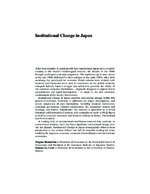Institutional Change in Japan
Proposal review
Contributor(s)
Blomström, Magnus (editor)
La Croix, Sumner (editor)
Language
EnglishAbstract
This is a new analysis of recent changes in important Japanese institutions. It addresses the origin, development, and recent adaptation of core institutions, including financial institutions, corporate governance, lifetime employment, and the amakudari system. After four decades of rapid economic growth in Japan, the 1990s saw the country enter a prolonged period of economic stagnation. Policy reforms were initially half-hearted, and businesses were slow to restructure as the global economy changed. The lagging economy has been impervious to aggressive fiscal stimulus measures and has been plagued by ongoing price deflation for years. Japan’s struggle has called into question the ability of the country’s economic institutions, originally designed to support factor accumulation and rapid development, to adapt to the new economic environment of the twenty-first century. This book discusses both historical and international comparisons including Meiji Japan, and recent economic and financial reforms in Korea, Scandinavia, Switzerland, and New Zealand, placing the current institutional changes in perspective. The contributors argue that, contrary to conventional wisdom that Japanese institutions have remained relatively rigid, there has been significant institutional change over the last decade.
Keywords
japanese; political; economy; lifetime; employment; non-performing; loans; system; labor; movementDOI
10.4324/9780203968819ISBN
9780415380157;9780415511667;9780415655194;9781134180578;9781134180561;9781134180523OCN
1048456904Publisher
Taylor & FrancisPublisher website
https://taylorandfrancis.com/Publication date and place
2006Series
European Institute of Japanese Studies East Asian Economics and Business Series,Classification
Regional / International studies
Asian history
Ethnic studies
Economics


 Download
Download Web Shop
Web Shop